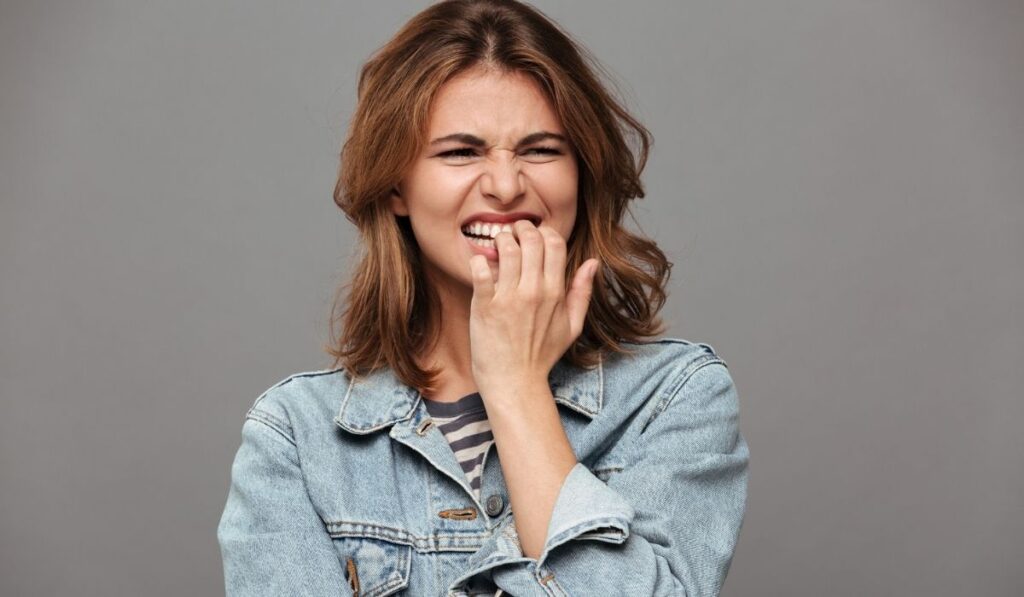It’s a fairly common sight to see people of all ages biting their nails. While some attribute the habit to nervousness, others say it’s a faster way to keep their nails trimmed. A small number even argue that it’s good for their teeth, but could that possibly be the case?
Nail-biting is one of the easiest ways to transfer harmful germs from your hands into your mouth (and then the rest of your body). Regular nail-biting can cause numerous dental issues, such as weakened roots, malocclusion, cracks in teeth, and erosion of enamel.
Nail-biting can be a nasty habit that’s hard to kick, but doing so is important for your health. In this article, we will not only discuss the potential damages brought on by nail-biting, but also share tips that will help you stop biting your nails once and for all!
How Nail-Biting Affects Your Teeth and Gums

If you’re a constant nail-biter, you may be thinking that you’ve never experienced any issues from the habit. Well, the reality is that you might have, but maybe you didn’t make the connection to your habit. Let’s look at some of the conditions nail biting can cause or make worse so you can understand the impact nail biting can have on your teeth.
Weakened Roots
One significant way consistent nail-biting affects your dental health is by weakening the roots of your teeth. This weakening happens because the biting moves the tooth slightly out of position. Constant and habitual tooth shifting can slowly destruct the bone that holds the teeth in place.
And those weakened roots can then make it more difficult to complete some dental procedures like attaching braces.
Malocclusion
Another dental condition linked to nail-biting is malocclusion. Malocclusion means that teeth are not properly aligned. One of the effects of malocclusion is that it leaves gaps in your teeth, especially between the two front incisors.
The correction of malocclusion may be done through orthodontics, such as braces, or with cosmetic dental procedures like composite bonding or porcelain veneers.
Cracks or Chips in Your Teeth
The nails are one of the strongest and most resilient parts of the body, due to the presence of keratin. Though the teeth are equally strong, using them to cut through keratin does them no favors. Nail-biting wears down the teeth and can cause cracks or chips to form.
Dental bonding can fix the problem in case of a minor chip or crack, but even when a chip is fixed it’s discolored and may draw attention, so, it’s best to avoid this rather than think of it as something you can fix if it happens. You can fix it, but you probably want to just avoid this entirely.
Bruxism
Teeth grinding, or bruxism, is one of the extreme results of frequent nail-biting. It occurs somewhat unconsciously while you chew on your nails. Teeth grinding can cause jaw pain, teeth sensitivity, headaches, tense muscles, bone loss, gum recession, and even temporomandibular joint (TMJ) disorder.
Growth of Harmful Bacteria
The hands, especially the nails, often carry harmful bacteria that you’ve picked up out in the world. Some of these bacteria follow whenever your nails end up in your mouth. Bacteria can lead to an oral infection or get into a sore, thereby resulting in the introduction and spread of disease to the rest of the body.
Gum Injury or Disease
Every time you bite your nails, you leave the edges jagged. These jagged edges could injure your gums, and if bacteria from your nails is then introduced into the open wound, it could cause gum disease or infection.
If you notice any injury on your gums, visit a dentist to get it checked out.
Wearing Down of the Enamel
The enamel is the proactive layer on the tooth. Constantly grinding the tooth against your nails wears down this layer. Enamel erosion can lead to tooth sensitivity.
How Do I Stop Biting My Nails?

Now that we’ve covered the adverse effects of constant nail-biting, let’s consider ways to stop or minimize this pesky habit. Most of the tips listed here are inexpensive and easy to follow; all they require is some effort and patience.
Understand What Triggers Your Nail-Biting Episodes
Usually, nail-biting episodes don’t happen in isolation. More often than not, an emotional cause or trigger brings about nail-biting. It might be nerves, boredom, anger, or anxiety. Identifying this trigger often helps you to minimize future episodes.
Oftentimes, we start biting our nails unconsciously. But when you realize what you’re doing, try to identify what caused it. If necessary, keep a daily journal of all the day’s episodes and triggers.
The goal here isn’t to see how much you’re biting. It’s to understand what has caused you to do so. When you know your nail-biting triggers, you can work on avoiding them altogether.
Use Bitter Nail Polish
Another way that you can eliminate nail-biting is by coating your nails with a bitter-tasting nail polish (on Amazon). These products are made specifically for nail-biters. When you start biting your nails and encounter the bitter taste, you instantly remember to stop.
Do Frequent Manicures
There is often a reduced tendency to bite your nails after a manicure session, since your nails look so nice and clean. You probably won’t want to ruin the new look.
Another alternative to doing a regular manicure is to keep your nails very short at all times. The less nail, the less there is to bite.
Find Other Alternatives to Nail-Biting
In most cases, those who bite their nails do so because they are trying to handle an overwhelming emotion. It is therefore advisable to find less-damaging coping mechanisms. These substitutes may include chewing gum, using a stress ball, or playing with a fidget spinner.
If boredom is the cause of nail-biting, look for mind-engaging activities that you can distract yourself with. You can also consider yoga or booking an appointment with a therapist.
Don’t Go Cold Turkey.
One mistake many nail biters make when trying to stop is thinking they can achieve it in one fell swoop. Not only is this virtually impossible, but it could leave you feeling even worse. The best way to stop nail biting is to do it in stages.
The goal should be a gradual reduction in the frequency of nail-biting, not an immediate stoppage. Some ways to achieve this are:
- Set realistic reduction goals.
- Don’t put yourself under unnecessary pressure.
- Understand that there will be setbacks as you try to quit nail-biting; don’t let them weigh you down.
- If you fail, pick yourself up and don’t stop trying. These things take time!
Seek Help from Family and Friends
One of the easiest ways to break any bad habit is to employ the help of others. You might ask your friends or family to gently call your attention to the fact that you’re biting your nails or to provide emotional support during difficult days.
A similar method is teaming up with a friend or family member who is also trying to stop nail-biting. That way, both of you can encourage each other and work together to achieve your shared goal.
Conclusion
While it’s understandable that you often can’t control the habit of nail-biting, you should understand it has some adverse side effects on your body. The harm to your teeth and the potential for germs to enter the body via your nails means it’s best to quit this habit.
No habit is easy to stop, but following the procedures listed above can go a long way.


